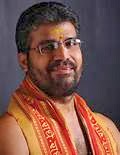The Process of Yoga : 4-1. Swami Krishnananda.
========================================================================
Friday, 07 Jul, 2023. 05:30.
Yoga and Meditation
Chapter 4: The Psychology of Yoga-1
=========================================================================
Chapter 4: The Psychology of Yoga-1.
Today we come to the more practical side of spiritual life, a necessity that arises automatically from the structure or the nature of things. We observed that the objective and the subjective sides of things run parallelly towards the destination of their evolution; and the two lines of evolution, or processes of development, seem to have a corresponding similarity and uniformity of action underlying them and controlling them even from outside.
The world-experience, or empirical perception, is the way in which the object is envisaged and looked upon by the subject as an external something. Spiritual experience, on the contrary, is the recognition and the experience of the underlying uniformity and unity that rules supreme over the apparently bifurcated processes known as the objective and the subjective sides of experience.
When the mental mode of the subject perceives an object as an external something, a modification takes place in the mental makeup. In Sanskrit, this transformation taking place in the mind due to the presence of an object in front of it is called a vritti. A psychosis, a modification, a sensation or a reaction that spontaneously takes place in the structure of the mind, or the mind-stuff, is a vritti. Just as when butter is brought near fire a transformation takes place in the lump of butter due to the effect produced by the heat of the fire, and just as objects that are dear or objects of hatred bring about a transformation in the mind of the subject perceiving the object, likewise, every object in the world brings about a corresponding transformation in the mind. This is what we call empirical experience, brought about by sensory contact and psychological cognition.
We continuously transform ourselves due to the very presence of objects outside us. This transformation is not necessarily conscious. It does not mean that we are always aware of the mental transformations taking place within ourselves. Part of this transformation becomes a content of our conscious experience, but the major part of it is unconsciously undergone. This is the peculiarity of our psychological makeup.
We have different layers of personality, and these various levels of our being determine our total experience. Our personality, the human nature, is not merely the conscious level of our activity or experience. We do not know our own selves wholly. We are ignorant of what is taking place in the major part of our own personality. This is the reason why we have moods and passages of experience, one succeeding the other, over most of which we have neither a control nor a proper knowledge.
A part of our personality is given to us as conscious experience. Similarly, a part of our bank balance may be in a current deposit, a part of it may be in a fixed deposit, and a part of it may be in a certificate. Whatever be the nature of the deposit, the whole of our financial resources is not in our current account, but part of it is drawn from the source for daily requirements. Likewise, a portion of our total experience is given to us as conscious activity. We draw upon the conscious level of our experience, and keep the major part in a fixed deposit because it is not necessary for daily experience. But, that fixed deposit can also be called into conscious experience when it is necessary. It can even be encashed prematurely when emergencies arise, or when we are in a difficult situation on the conscious level.
*****
To be continued












Comments